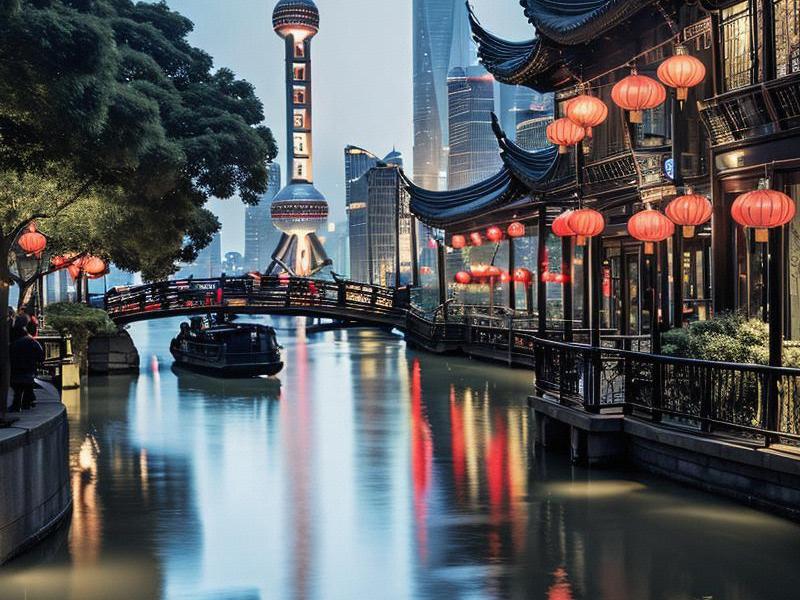Shanghai, a vibrant metropolis in China, has long been a symbol of the country's rapid modernization and globalization. This article delves into the multifaceted aspects of Shanghai, exploring its economic prowess, cultural vibrancy, urban development, and its role as a global city.

Shanghai, the largest city in China and one of the world's most dynamic urban centers, has undergone a remarkable transformation over the past few decades. Once a small fishing village, it has grown into a global financial hub, a cultural melting pot, and a symbol of China's economic rise.
The city's strategic location at the mouth of the Yangtze River has played a pivotal role in its development. Shanghai's port is one of the busiest in the world, facilitating trade and commerce with countries across the globe. This maritime advantage has been instrumental in Shanghai's economic success, making it a key player in China's export-driven economy.
Economically, Shanghai is a powerhouse. It is home to the Shanghai Stock Exchange, one of the largest stock exchanges in Asia, and the city's financial district is a hub for banking, insurance, and other financial services. The presence of multinational corporations, foreign investments, and a thriving startup ecosystem has further cemented Shanghai's status as an economic powerhouse.
The city's skyline is a testament to its rapid urban development. Iconic landmarks such as the Oriental Pearl Tower, the Jin Mao Tower, and the Shanghai Tower dominate the skyline, showcasing the city's modernity and ambition. These skyscrapers house offices, luxury apartments, and world-class shopping and dining experiences.
爱上海最新论坛 However, Shanghai's development is not without challenges. The city faces issues such as traffic congestion, air pollution, and housing shortages. To address these challenges, the government has implemented various initiatives to promote sustainable urban development. These include the construction of new subway lines, the promotion of green spaces, and the development of smart city technologies.
Culturally, Shanghai is a unique blend of tradition and modernity. The city is known for its rich history, which dates back thousands of years. It was one of the first cities in China to open up to the outside world during the 19th century and has since been influenced by Western culture. This cultural fusion is evident in the city's architecture, cuisine, and arts scene.
The Bund, a historic waterfront area, is a popular tourist destination that showcases the city's colonial past. The area is lined with beautiful buildings from the early 20th century, offering stunning views of the Huangpu River and the modern skyline of Pudong. On the other side of the river, Pudong is home to the Lujiazui financial district, where some of the world's tallest skyscrapers are located.
Shanghai's culinary scene is another highlight. The city is famous for its diverse range of dishes, including the iconic xiaolongbao (soup dumplings), shengjianbao (pan-fried dumplings), and the rich and flavorful huangjiu (yellow rice wine). The city's night markets and food streets offer a taste of local delicacies, while high-end restaurants serve international cuisine.
上海水磨外卖工作室
The arts scene in Shanghai is thriving, with numerous museums, galleries, and theaters showcasing a wide range of cultural activities. The Shanghai Museum is renowned for its extensive collection of Chinese art, while the Power Station of Art is a contemporary art museum that hosts exhibitions by both Chinese and international artists. The city also hosts various cultural festivals throughout the year, such as the Shanghai International Film Festival and the Shanghai International Art Festival.
Shanghai's education system is another area of strength. The city is home to several world-class universities, including Fudan University and Tongji University, which attract students from around the globe. These institutions are known for their research capabilities and academic excellence, contributing to the city's intellectual capital.
In recent years, Shanghai has been actively promoting innovation and entrepreneurship. The city has established various innovation parks and incubators to support startups and tech companies. The Zhangjiang Hi-Tech Park, for example, is a major hub for the biotechnology and information technology industries. The city's government has also introduced policies to encourage foreign investment and talent attraction, further boosting its innovation ecosystem.
上海品茶论坛 Shanghai's role as a global city is evident in its international collaborations and partnerships. The city is a member of the Global Cities Initiative, a partnership between the Brookings Institution and JPMorgan Chase, which aims to promote sustainable urban development. Shanghai has also hosted numerous international events, such as the World Expo in 2010, which attracted millions of visitors from around the world.
The city's leadership in sustainability is another area of focus. Shanghai has set ambitious goals to reduce carbon emissions and promote green development. The city has implemented various initiatives, such as the construction of green buildings, the promotion of electric vehicles, and the development of renewable energy sources. These efforts have positioned Shanghai as a leader in sustainable urban development.
Despite its many achievements, Shanghai faces challenges in areas such as social inequality, environmental sustainability, and aging population. The city's government is working to address these issues through various policies and initiatives. For example, the city has introduced measures to improve public transportation, reduce traffic congestion, and enhance air quality. It is also investing in healthcare and social welfare programs to address the needs of its aging population.
In conclusion, Shanghai is a dynamic metropolis that continues to evolve and adapt to the changing global landscape. Its economic prowess, cultural vibrancy, urban development, and role as a global city make it a fascinating subject of study. As Shanghai looks to the future, it remains committed to sustainable development and innovation, positioning itself as a model for other cities around the world.